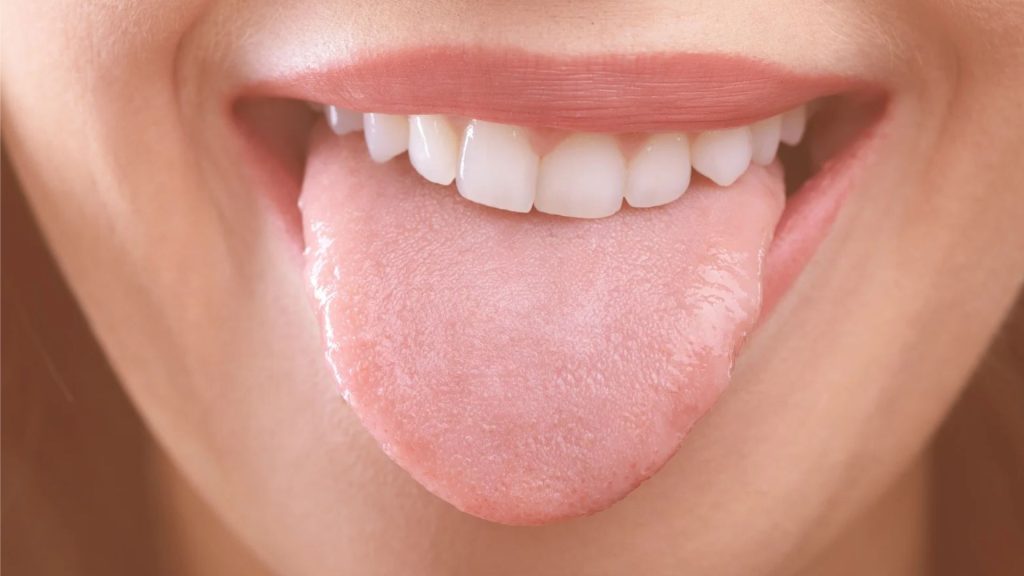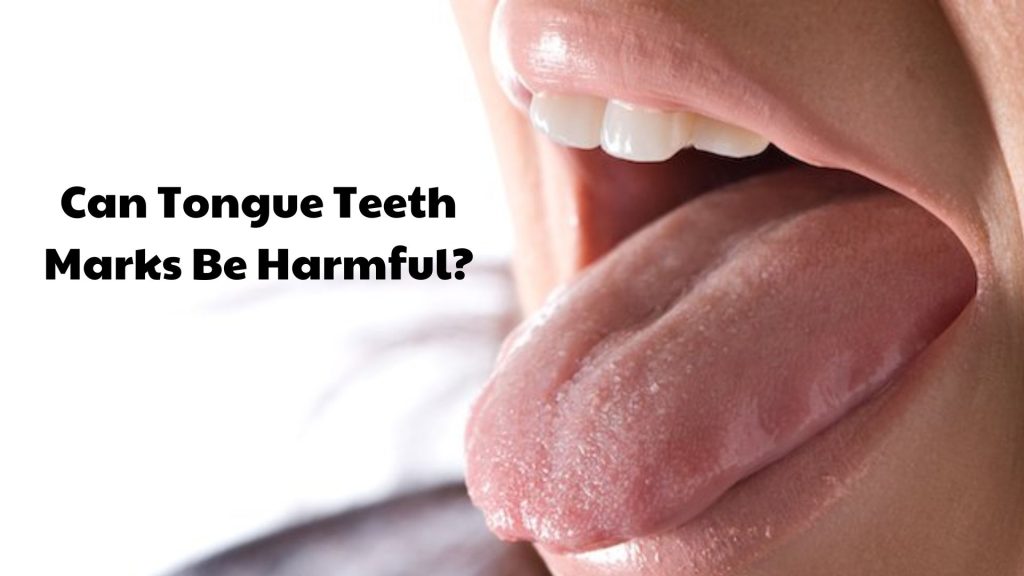Teeth marks on tongue—tongue bites that leave lines or fissures. They’re typically not unpleasant, but they might make us concentrate on our mouth health and feel odd in the mirror. Tongue teeth marks may develop from a multitude of factors, from sleeping with your tongue bit to significant health issues. In this case, knowing its origins and treatment might boost our health confidence. To understand teeth marks on the tongue, we’ll examine everyday behaviors and holistic health issues. this and know when to consult a doctor to rule out significant issues.
Teeth Marks On Tongue – What Is It?

Teeth marks on the tongue are a term that describes a very common symptom, a phenomenon that is often seen on the surface of the tongue. When individuals bite their teeth when asleep or anxious, dental prints may develop on the tongue. In most situations, this does not result in major consequences and does not need specialized care. However, if you are worried about this issue or have further symptoms, it is recommended that you consult with your doctor or a medical expert for appropriate advice and to discover the underlying reason.
Symptoms Tongue Teeth Markings
The teeth markings on tongue symptoms section delves further into how teeth marks on the tongue might appear and what indicators you can see immediately on the surface of the tongue. Here are some indications of tooth marks on the tongue:
- Teeth Marks or Dots: The major sign of tongue teeth markings is teeth-shaped fissures or spots. The middle or side of the tongue frequently has these markings.
- Sensibility: The intensity of cracks or print imprints might induce searing agony, especially with hot or acidic meals or drinks.
- Mild swelling: Latching or biting may swell or inflame the tongue. This may cause pain.
- Discomfort with speaking and swallowing: If the cracks or dots hurt, you may have trouble talking or swallowing.
Considering the indications and symptoms of a tooth-marked tongue, we must also examine its health risks. In the following part, we’ll examine if tongue teeth marks are harmful and how to maintain them.
Causes Of Tongue Teeth Markings
In this part, we’ll discuss the major causes of spots or markings on the tongue’s surface, sometimes known as teeth marks. Recognizing this state and its potential manifestations in our everyday lives requires an appreciation of these factors. Let’s examine the most common reasons why people have tooth marks on their tongues:
Xerostomia
Teeth marks on the tongue indicate a dry oral environment, which might be caused by xerostomia. Saliva washes away plaque, bacteria, and poisons in the mouth. Inadequate saliva production promotes the buildup of bacteria and toxins in the mouth. Plaque and other chemicals in the mouth that promote germ development may cause teeth marks on the tongue. These microorganisms have the potential to hurt your tongue and affect the color of your teeth.
Furthermore, dry mouth may lead to other problems such as gum disease and damage to the mouth’s inside.
Plaque And Impurities
Tooth marks on the tongue are often the consequence of plaque and pollutants that have accumulated and have not been adequately cleaned. Plaque, a layer comprising bacteria, mineral contaminants, and dust particles, may promote bacterial development. This bacterium may create tongue teeth stains and irritation. Impurities such as food and dust particles from the environment can have a role. When plaque and impurities collect on the tongue, bacteria thrive. Without adequate cleaning, fatty and colored meals may stain the tongue.
So, plaque and impurities allow bacteria to thrive and stick to the tongue, causing tongue teeth markings.
Infections And Bacteria
Bacteria and diseases largely generate tongue teeth markings via a sequence of interacting processes: When bacteria are in the mouth, they can make a plaque, which is a film made of bacteria, minerals that aren’t pure, and dust. Plaque builds on the tongue, particularly in hard-to-reach regions. This provides an excellent environment for bacteria to develop and flourish. Bacteria in plaque may create waste and food breakdown products, resulting in foul breath and favorable circumstances for infection. Infection may develop when germs enter the cuticles of the tongue and produce irritation. Symptoms include redness, swelling, and discomfort. Bacteria create harmful chemicals that increase infection risk and tongue staining.
Incorrect Sleeping Position
When you sleep in the wrong position, the tongue and muscles may rub against each other and leave tooth marks on the tongue. Poor sleeping habits might damage your tongue:
- Sleeping with your mouth open: When you sleep with your mouth open, your tongue can come into touch with your teeth and the mucus tissues in your mouth. Over time, this steady pressure and rubbing can leave marks on the tongue.
- Tilting your head too far forward: When you sleep with your head inclined too far forward, your tongue might push against other structures in your mouth, resulting in teeth marks on your tongue.
- Overpressure: People with nightmares or tension may sleep with excessive tongue pressure. The tongue may be damaged and tooth marks may form.
Smoking
The physical and chemical properties of tobacco are mostly to blame for how smoking colors teeth and the tongue. Cigarettes contain addictive nicotine, which impairs mouth and tongue blood circulation. This may diminish tongue blood circulation, causing color loss and dental stains.
Also, smoking makes smoke and raises the temperature, which can make your mouth and tongue feel dry. Because the air is dry, the mouth and tongue are more likely to get hurt and lose wetness. This can make it easier for plaque and other impurities to form, which can leave tooth marks on the tongue. Cigarette smoke includes dust particles and germs, and smoking on a daily basis raises your risk of gum infection and other oral health issues.
Can Tongue Teeth Marks Be Harmful?

No, if teeth marks on the tongue only last a short while and are accompanied by no other symptoms, it is unlikely that you need medical attention. However, it might be an indication of health concern if the disease continues or is accompanied by other symptoms.
What Illness Does Tongue Tooth Mark Indicate?
Tongue teeth markings may indicate many diseases, however, they are not always adequate to diagnose one. In most cases, a doctor will need to consider a number of additional symptoms and indicators in addition to teeth marks on the tongue before making a diagnosis. The following medical issues have been linked to tongue scarring caused by teeth:
- Jaw muscle disorders: Tongue biting may occur during sleep or other settings due to jaw muscle problems. This might leave tongue teeth marks.
- Diabetes: Dry lips and sugar cravings may induce tongue biting or bites with diabetes.
- Nervous disorders: Certain neurological problems may result in tongue biting due to involuntary movements of the jaw and mouth muscles.
- Sleep disturbances: Tongue biting may occur during sleep due to insomnia or narcolepsy.
- Psychological problems: Stress, anxiety or psychological disorders can cause the habit of biting the tongue.
In conclusion, keep in mind that a correct diagnosis of a medical issue necessitates inspection by an expert. If you have chronic teeth marks on your tongue that are accompanied by other symptoms, you should see your doctor for an examination and proper diagnosis.
Manage And Prevent Tongue Teeth Marks
The most essential thing to do to avoid teeth stains on the tongue is to practice good oral hygiene. Due to plaque, pollutants, and germs on the tongue, teeth frequently form. From a dentist’s perspective, we have some important advice. Brush your tongue on a regular basis using a tongue brush or a soft toothbrush. This helps eliminate plaque and pollutants from the tongue and minimizes the chance of tooth discoloration. After cleaning your teeth and tongue, use mouthwash to decrease germs. Keep your mouth wet by drinking enough water to prevent a dry mouth, which may increase bacterial development and the creation of teeth stains on the tongue. Regular dentist appointments assist in preserving dental health and advise on tongue control and tooth stain avoidance. Remember that tongue teeth marks may cause foul breath, oral health issues, and aesthetic issues. Maintaining total oral health requires proper tongue care.
When to consult a dentist?
Here are some instances when you should seek medical attention if you see tooth marks on your tongue:
- Tongue teeth marks persist: If you change your tongue-biting habits but still have teeth marks on your tongue, this may be an indication. symptom of another illness.
- If there are accompanying symptoms: To establish the reason for a tongue teeth mark with symptoms including swelling, discomfort, bleeding, or other peculiar indicators, consult your doctor.
- You may have persistent or significant medical issues: If you have experienced major health issues like heart disease, diabetes, or other chronic diseases, tongue markings may indicate a decline in your health.

Teeth marks on the tongue may be minor, but they are nevertheless crucial to notice. They are usually innocuous, but they may signify something more serious is going on. Having our teeth and gums examined on a regular basis is one of the finest ways to ensure our health. At Spring Orchid Dental, dentists are competent, knowledgeable, and kind. Our dentists are competent to assess your dental health. Regular dental checkups may let your dentist notice tongue changes or other warning symptoms before they worsen. Make an appointment for your next dental exam at Spring Orchid Dental. We’re here to help you maintain your teeth in good health so you can smile confidently.
FAQs
Is Stress A White Tongue?
Yes, stress causes a white tongue. In white tongue, also known as “crow’s tongue” or “chicken tongue,” the tongue becomes discolored or whiter than normal. One of the reasons for this illness is stress, both physical and psychological:
- The immune system may be affected by emotional stress, worry, and mental strain, changing tongue color. Other factors include:
- Stress increases tongue epithelial cell production, resulting in a white tongue.
- Blood circulation changes: Stress may alter tongue color.
When under pressure, the body produces less porcelain, which causes the tongue’s top layer to seem less yellow and more white. A momentary white tongue seldom causes major issues. If it continues or is accompanied by discomfort, swelling, or bleeding, see a doctor for a diagnosis.
How Does Vitamin Deficient Tongue Look?
A vitamin deficit may cause tongue alterations. Different vitamin deficits might modify tongue appearance. A few examples:
- Vitamin B12 Deficiency: A vitamin B12 deficiency may cause glossitis, a swollen, smooth, and painful tongue. The tongue may be red or meaty and lack papillae.
- Iron Deficiency: Anemia from iron shortage may cause a pale or pale-yellow tongue. The tongue may feel smooth, painful, and irritated.
- Vitamin C Deficiency: Lack of vitamin C may induce scurvy, which causes weakness, anemia, and bleeding gums. The tongue may be large, inflamed, and have purple or red blotches.
- Riboflavin (Vitamin B2) Deficiency: A riboflavin shortage may cause angular cheilitis or stomatitis. Cracks or sores around the mouth corners and tongue inflammation or alterations might result from this illness.
What Foods Clean Your Tongue?
You can keep your tongue clean and your teeth healthy by eating certain foods. Some meals that may help keep your tongue clean include:
- Fruits and Vegetables.
- Natural Yogurt.
- Citrus Fruits.
- Water.
- Green Tea.
- Fresh Herbs.
- Chewing Sugar-Free Gum.
Thus, although these meals might help keep your tongue clean, a tongue scraper is also essential. Regular brushing, flossing, and a balanced diet may help keep your mouth healthy and fresh.





